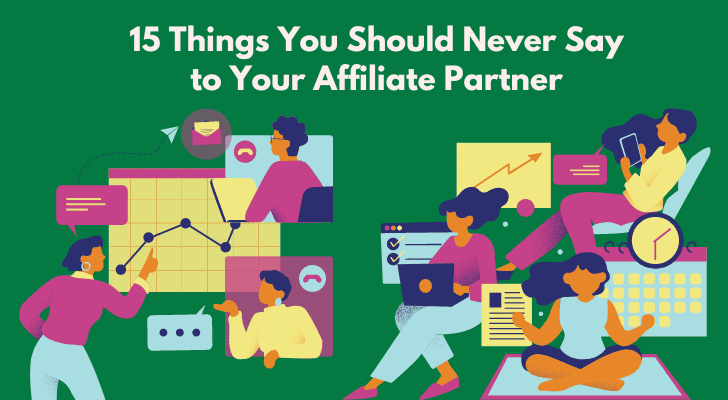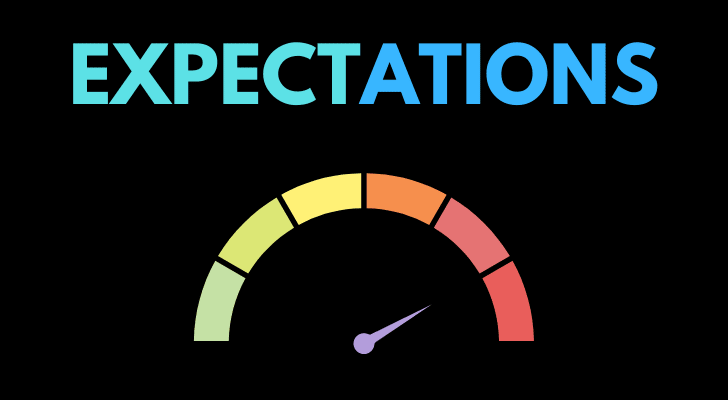Affiliate partnerships are a key component of many successful brands, but like any relationship, it's the communication method that makes difference. While constructive feedback is necessary for growth, there are certain things you should never say to your affiliate partner. The wrong words can damage trust and hinder progress towards shared goals. So here are 15 things you should avoid saying to your affiliate partner in order to maintain a healthy and productive partnership. Get ready to learn some valuable tips on how to improve communication with your affiliates!

Did You Know?
- 50% of business disputes involve some level of personal conflict between owners. (American Arbitration Association)
- Around 30% of small business owners report experiencing aggressive competitive tactics from other local businesses. (Small Business Administration)
- 60% of entrepreneurs say that networking disputes have led to significant stress and business challenges. (Entrepreneur Magazine)
- 1 in 5 business owners has experienced online harassment or bullying from competitors. (Cyberbullying Research Center)
- 35% of business partnerships experience tension due to assertive or aggressive communication styles. (Forbes)
1. You're not doing enough
Asking your affiliate partner if they're doing enough to promote your business could come off as accusatory, and may damage the relationship. Instead of blaming them for not doing enough, try approaching it from a different angle.
Firstly, make sure that you've set clear expectations and goals from the beginning. If these haven't been communicated effectively, it's unfair to expect them to know what they should be doing.
Secondly, ask questions about their approach and workflow. Perhaps there are areas where they're struggling or need additional resources or support. By working together to identify problems, you can find solutions that benefit both parties.
Affiliate partnerships are a two-way street - if you want more effort put in on their end, consider offering additional incentives such as higher commission rates or exclusive promotions for their audience. Keep communication open and constructive instead of critical.
2. I'm not happy with your performance
This phrase can come across as harsh and unprofessional, which may damage the relationship between you and your affiliate partner. Instead of using this phrase, try to identify specific areas where they need improvement.
Start by discussing what goals were set for them in the first place and why exactly you believe they are falling short on these goals. Provide constructive feedback on how they could improve their performance. Be sure to use positive language while highlighting any shortcomings as well as expressing confidence in their ability to turn things around.
Another option is scheduling regular check-ins or progress reports so that both parties have clear expectations about what's required going forward. By doing this regularly, it'll help keep everyone focused on the end goal whilst also offering opportunities for open communication without pointing fingers or laying blame.
You should really make conversations from a position of partnership rather than criticism if you hope to maintain strong relationships with valuable affiliates over time.
3. Your numbers are down

As an affiliate partner, hearing that your numbers are down can be disheartening. However, you'd better find out why this may be happening and what steps you can take to improve the situation.
Firstly, it's essential to analyze your current marketing strategies and see if there are any areas where you can make improvements. Are you targeting the right audience? Is your messaging clear and effective? Are you utilizing all available channels for promotion?
Secondly, consider reaching out to your merchant partner for feedback on their end. Perhaps there have been changes in their product offerings or pricing that have affected sales. Or maybe they've noticed a shift in consumer behavior that requires a different approach from affiliates.
Don't give up hope! Affiliate marketing is a constantly evolving industry, and ups and downs are completely normal. Take this as an opportunity to learn and grow as an affiliate partner - try new tactics, experiment with different platforms, and stay open-minded to feedback from both merchants and customers alike.
Did You Know?
- 25% of business owners cite ‘personality clashes’ as a major challenge in business relationships. (Harvard Business Review)
- In a survey, 40% of business owners reported having lost a valuable business relationship due to confrontations or assertive negotiations. (Journal of Business Ethics)
- 70% of entrepreneurs believe that clear, respectful communication is key to avoiding disputes among business owners. (Inc. Magazine)
- Conflict among business owners leads to a productivity drop in over 65% of cases. (MIT Sloan Management Review)
- Only 15% of business owners feel prepared to handle aggressive negotiations or bullying from peers in their industry. (Negotiation Journal)

"Of course my numbers are down, and that's your problem, not mine. You'd better think about improving your products. I'm busy promoting other brands. You can let me go if you want."
4. We need to talk about your commission rate
When you signed up to become an affiliate partner, the commission rate was clearly outlined in the agreement. However, as your business starts to grow and generate more sales for our company, it's understandable that you may want to discuss increasing your commission rate.
Any changes made to your commission rate will directly impact our profitability. Therefore, we must take a strategic approach when discussing potential adjustments.
One thing we can do is review your current performance metrics and see if there are any areas where improvements can be made. This could include optimizing campaigns or targeting specific demographics more effectively. By increasing your performance and driving more conversions, it may justify an increase in commission rates.
Another option is exploring different payment models such as pay-per-action or tiered commissions based on performance levels. These approaches allow us both to benefit from increased sales and incentivize higher-quality traffic generation.
Discussing commission rates can be uncomfortable at times. But open communication and collaboration between affiliates and partners is needed for long-term success.
5. I'm thinking about terminating our agreement
As an affiliate partner, receiving a message from the business owner stating that they are contemplating terminating your agreement can be devastating. There could be several reasons they have come to this decision.
Perhaps the products you are promoting are not relevant to your audience or maybe there is a lack of communication between both parties. Regardless, it's essential to handle the situation professionally and try to find out what went wrong.
Before jumping straight into panic mode, take some time to evaluate the current situation. If you feel like you haven't been performing well enough, ask for feedback on how you can improve. If it's due to other factors beyond your control such as changes in their marketing strategy or budget cuts, then accept the news gracefully and professionally.
Did You Know?
- 45% of business owners have reported losing sleep over disputes with other business owners or competitors. (American Journal of Entrepreneurship)
- 30% of business founders cite conflict with co-founders as a reason for their business failing. (Startup Genome Project)
- 55% of business owners believe that competitive pressures can lead to unethical behavior among peers. (Journal of Business Ethics)
- A survey found that 20% of business owners have felt pressured to make assertive comments in industry forums to maintain their standing. (Social Media Today)
- Approximately 10% of small business owners have sought legal counsel due to bullying or aggressive tactics by a business competitor. (National Small Business Association)
It might also be worth suggesting ideas that could potentially salvage any issues before deciding on termination entirely. You never know; this might help turn things around and strengthen your partnership further.
If after exploring all avenues and communicating transparently with one another has not resolved any conflicts - moving forward without each other may be for the best interests of both parties involved.
6. You're not meeting my expectations

Affiliate partners who work their socks off for the merchant would feel disheartened to hear that they're not meeting the expectations.
Make sure that they fully understand what exactly your expectations are. Are you clear with them that you are looking for a certain number of sales per month? Increased traffic to your site? More social media promotion? Once they have a clear understanding of your goals, you can help them create a plan detailing how they can achieve them.
Communication is key here - make sure to check in regularly with your affiliates and keep them updated.
Take responsibility for any mistakes or areas where you may have fallen short. Avoid making excuses and instead focus on finding solutions and ways to improve moving forward.
Did You Know?
- Nearly 25% of business owners have experienced or witnessed unfair business practices among peers in their industry. (Federal Trade Commission Reports)
- Online business communities see a 15% incidence rate of assertive or aggressive exchanges between business owners. (Community Roundtable)
- 22% of business owners report having been the target of negative campaigns or comments by competitors on social media. (Digital Marketing Institute)
- In a survey, 40% of entrepreneurs expressed concern over the impact of aggressive competition on their mental health. (Mental Health America)
- Conflict resolution training reduces the negative impact of assertive comments among business partners by 50%. (International Journal of Conflict Management)
7. You're not promoting my products enough
As a merchant, you should know that your affiliates may have different strategies and approaches when promoting your products.
If you find that your affiliate is not promoting your products enough, instead of accusing them of not doing their job properly, try identifying the root cause. Perhaps they aren't familiar with the product or don't fully understand its value proposition. In this case, providing training sessions or relevant resources can help increase knowledge and boost promotion efforts.
It could also be possible that their target audience doesn't align with your product niche. It's essential to know who their followers are so you can collaborate on campaigns which would resonate better with them.
Additionally, ensure that your affiliates have access to high-quality promotional materials such as banners and images; it will make their job much easier while keeping things aligned with brand guidelines.
Every partnership requires open communication and collaboration to achieve success for both parties involved.
8. I'm not getting enough sales from you
You're not getting enough sales, why? Are there particular products that aren't selling well? Is there a lack of promotion for these products? Once you have pinpointed the problem area, work together with your affiliate partner to come up with solutions.
One potential solution may be to adjust the marketing strategy for those underperforming products. This could involve targeting a different audience or experimenting with new advertising channels.
Another solution could be to offer incentives or bonuses for successful sales of certain products. This motivates both parties and encourages more effort towards promoting those items.
It's also worth discussing any external factors that may be impacting sales such as market trends or changes in consumer behavior.
Blaming one another won't solve anything. Instead, remain positive and collaborative in finding ways to improve sales performance together.
9. You're not driving enough traffic to my site

One of the most common complaints affiliate partners receive from their program managers is that they're not driving enough traffic to their site.
Consider whether your partner has access to the right advertising channels and campaigns. Different target audiences respond better to different types of ads and promotions, so make sure you're working together to create content that will appeal specifically to your intended audience.
Another key factor in driving traffic is search engine optimization. Make sure your partner understands how keywords, meta descriptions, and other SEO tactics can improve rankings on Google or other search engines. By optimizing both ad content and website design with these strategies in mind, you can help boost visibility among potential customers.
Remember that building a strong brand reputation takes time. If you feel like your partner isn't delivering enough results yet, try giving them support and guidance instead of criticism. With patience and collaboration between both parties involved in the partnership agreement , driving more traffic over time should become a natural outcome.
This hidden knowledge used by the elites will let you generate wealth and prosperity

10. Can I speak to you on the phone?
Asking to speak on the phone with your affiliate partner might seem like a good way to improve communication and build rapport, but how do you know that they can talk? They may be deaf. They may have speech impediment. Have you ever considered that? Or simply, some people might feel uncomfortable talking on the phone or may not have time for lengthy conversations.
Instead of assuming that a call is necessary, try asking if they prefer email or another form of communication. This shows that you respect their time and allows them to respond in a way that works best for them.
If you do end up scheduling a call, make sure to prepare an agenda beforehand so that both parties can stay focused and productive. Be respectful of their schedule and keep the conversation brief if needed.
Effective communication doesn't always require speaking on the phone. Utilize other channels such as email or instant messaging when appropriate and always prioritize your affiliate partner's preferences for communication.
11. Your campaigns are underperforming
When you notice that your affiliate partner's campaigns are underperforming, instead of simply pointing out the problem, try to offer some possible solutions or suggestions for improvement.
Firstly, ask questions about target audience, messaging, and ad placement in order to identify areas for improvement. You might also suggest testing different approaches or experimenting with new channels.
Offer additional resources or support to help improve their campaigns. This could include providing them with more detailed product information or graphics, helping optimize landing pages, or even running joint campaigns together.
Approach the conversation with an open mind and willingness to collaborate on finding a solution that benefits both parties involved.
12. You're not generating enough leads

As an affiliate partner, generating leads is one of the primary goals of your partnership with a brand. If you're not meeting those expectations, prepare yourself to have an open and honest conversation about why that may be happening and what can be done to address the issue.
Firstly, see if you are targeting the right audience for the brand's products or services. Are you reaching out to people who are likely to be interested in what they offer? It might be worth revisiting your marketing strategy and making sure you're targeting the right demographics.
The other thing is whether your messaging aligns with the brand's values and tone. Make sure that your content is consistent with their branding guidelines so that potential customers aren't confused or put off by mixed messages.
It could also be worth exploring new channels or tactics for lead generation. Perhaps there are untapped opportunities in social media advertising or influencer partnerships that could help boost your efforts.
13. You are too old/young to promote my products
Ageism is a harmful and discriminatory practice that has no place in the affiliate marketing industry. Assuming someone's ability to promote your products based on their age is not only unfair but also unproductive.
Many successful affiliates are seniors who have years of experience and knowledge about the market, while many young people bring fresh perspectives and innovative techniques to the table. Age does not determine one's ability to succeed in this business.
Assuming that someone is too old or too young to promote your product limits your potential audience reach and excludes valuable partners from joining your program. Instead of focusing on age, look at an affiliate's track record, performance history, and strategies for promoting products before making any assumptions.
In addition, utilizing diverse representation in your affiliate program can attract a wider range of consumers, including those who may be looking for products marketed towards specific age groups.
It all comes down to skills and expertise rather than age. Avoiding ageism can help you build authentic relationships with potential partners while opening up new opportunities for growth within your business.
14. We need to talk about your payment
When discussing sensitive topics like payment, you should really approach this conversation with tact and respect for your partner.
Before bringing up the topic of payment, take a moment to review your agreement and ensure that all terms are clear and agreed upon by both parties. If there are any discrepancies or issues, address them calmly and professionally.

"I made $25 but you only sent me $1.25...what was that?"
"well...we had to take off 15% commission and $20 admin fee."
"You kidding, right?"
When discussing payments with your affiliate partner, be transparent about any changes in commission rates or payment schedules. Make sure they fully understand the reasons for these changes and how they will impact their earnings.
If there are concerns about late payments or inaccurate tracking of sales, work together to find a solution that benefits both parties. This may involve reviewing tracking methods or adjusting payment schedules.
Remember that your affiliate partner is a valuable asset to your business and deserves fair compensation for their efforts. Approach this conversation with empathy and an open mind, seeking solutions that benefit both parties.
Be respectful of your partner's contributions while also advocating for fair compensation within the parameters of your agreement.
15. Your promoting my products to useless countries
Avoid telling your affiliate partner that they are promoting your products to useless countries. This statement may come off as insensitive and offensive. Yes, some countries are richer than others. But people who can afford certain items reside all over the world.
Instead of criticizing their marketing strategy, try offering suggestions on how to improve the targeting of their audience or finding ways to expand into more profitable markets together.
Wrapping Up
Your affiliate partner is a vital aspect of your business, so a healthy relationship should be maintained with them. Avoiding these 15 phrases will not only prevent conflicts but also help in fostering strong partnerships. Remember that communication is key, and when issues arise, handle them professionally and respectfully.
By keeping these things in mind, you can build long-lasting relationships with your affiliates based upon mutual respect and trust that ultimately benefit both parties involved in the partnership!
What Do You Advocate?
